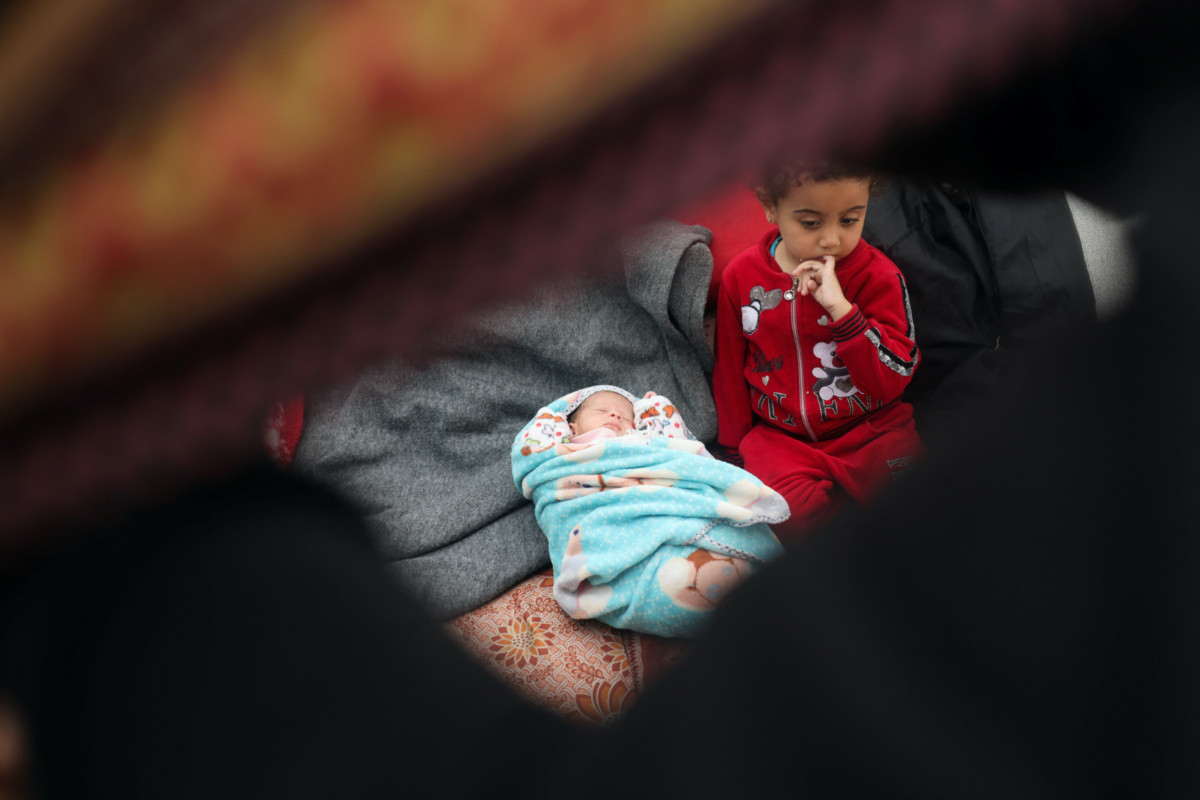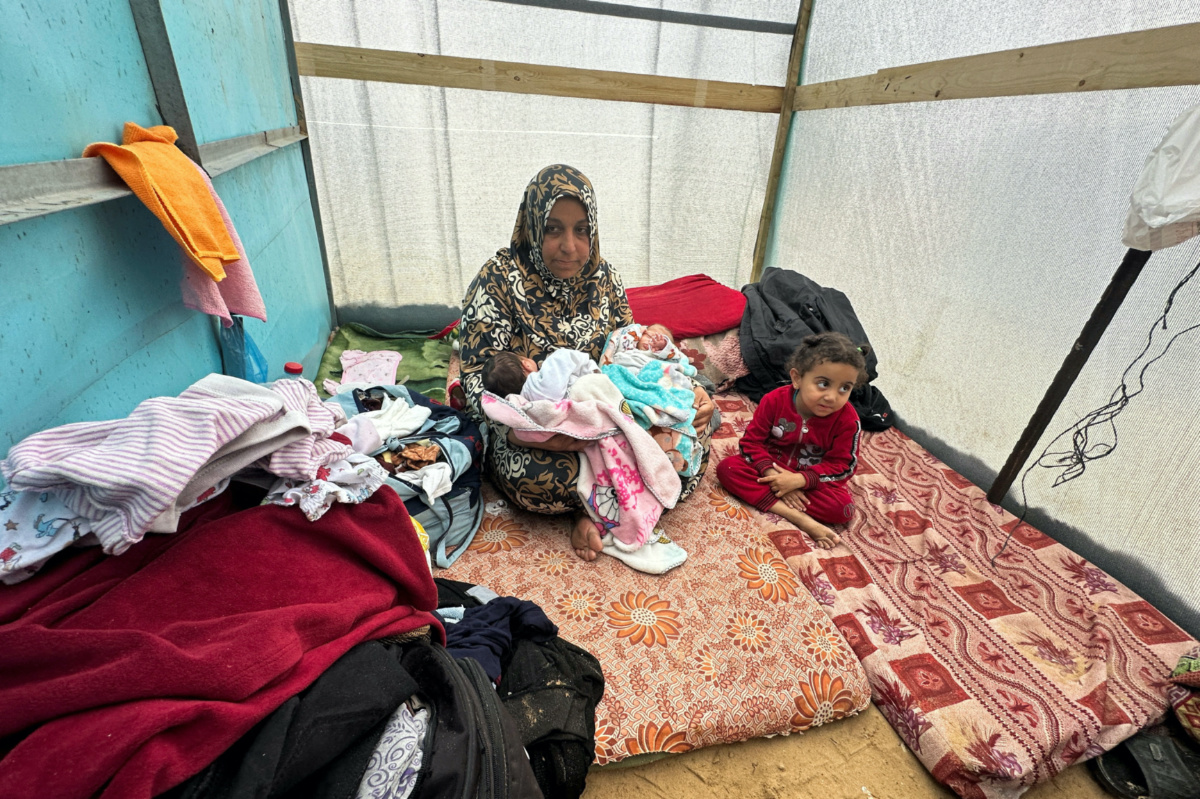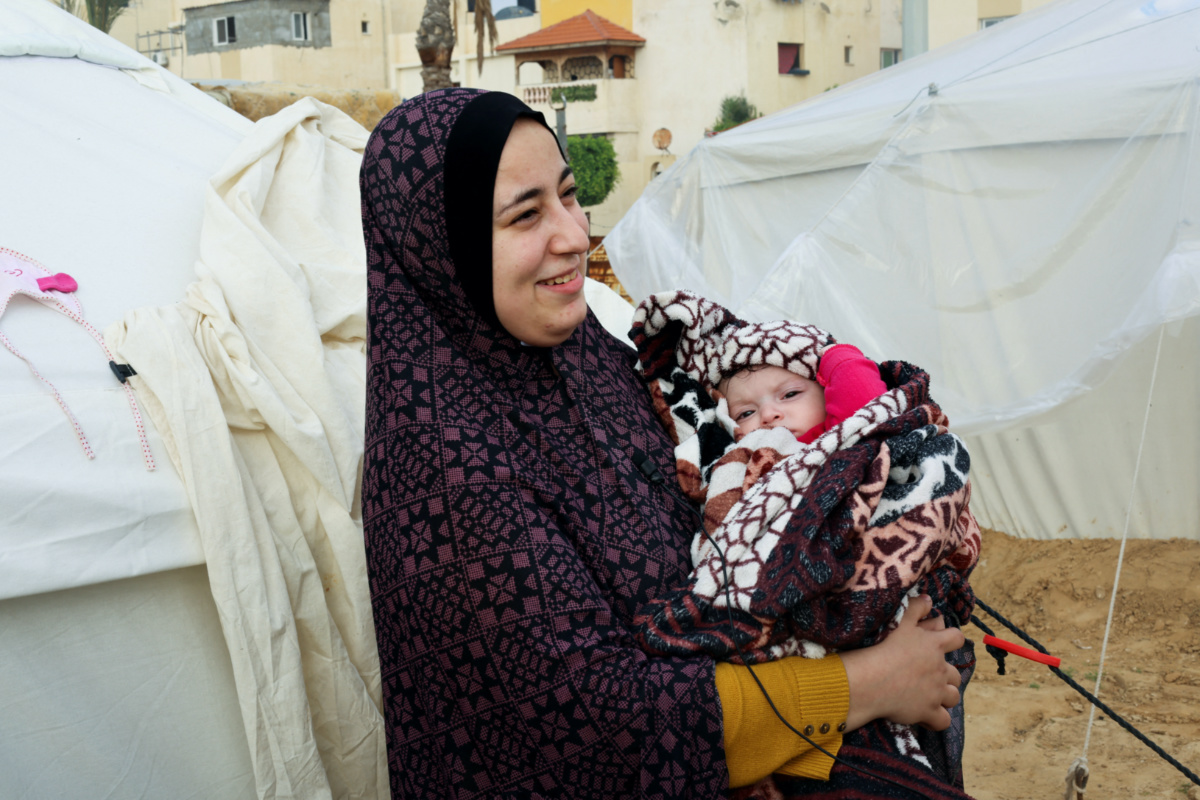Rafah, Gaza Strip
Reuters
The grandmother has a simple wish for her twin baby grand-daughters, Alma and Salma: they should be in a clean, safe room where they can be bathed.
Instead, the infants are living in a tent in a camp for displaced people in Rafah, southern Gaza. Their mother cannot breastfeed them because she is not getting enough nutrition for her body to produce milk. And they have never been bathed.

A girl sits next to Alma Al-Jadba, a twin Palestinian baby girl who was war born during the conflict between Israel and Hamas, in a tent where they shelter with their displaced family who fled their house due to Israeli strikes, in Rafah in the southern Gaza Strip, on 17th December, 2023. PICTURE: Reuters/Saleh Salem
Alma and Salma are part of a generation of Gaza babies born into homeless, destitute families struggling to survive Israel’s ferocious military assault on their crowded strip of land, which has caused a humanitarian catastrophe.
Their grandmother, Um Mohammed al-Jadba, struggles every day to find water to make them bottles of formula milk. She boils the water in a thermos flask on a fire outside the tent.
“They are a month old now, and have not been bathed yet. Do you see the space they are living in?” she said, holding a baby in the crook of each arm as she sat inside the tent. The floor consisted of mats and blankets spread on sand.
A few belongings were hanging in plastic bags from plywood slats that held up the roof of the tent. Otherwise, precious possessions such as clothes and a plastic water bottle were piled on the floor, around the edges of the mats.
Al-Jadba said four babies in her family had been born into displacement since the start of the war: her daughter-in-law gave birth to a girl, then her sister-in-law had a boy, then Alma and Salma were born to her other daughter-in-law.
It was a struggle to feed all of them, she said. The whole family was hungry.
“There is no nutrition (for the mothers), nor food for them to eat, how can they breastfeed? There is nothing for them to eat. Every day I feed them thyme, there is nothing else for them to eat,” she said.
The family had first moved from Gaza City to Khan Younis, the main city in southern Gaza. The twins were born there, in Nasser hospital. Then, as Israeli forces extended their ground assault into the south, the family moved again to Rafah.

The grandmother of Salma and Alma Al-Jadba, twin Palestinian baby girls who were war born during the conflict between Israel and Hamas, holds them in a tent where they shelter with their displaced family who fled their house due to Israeli strikes, in Rafah in the southern Gaza Strip on 17th December, 2023. PICTURE: Reuters/Fadi Shana
“We don’t eat a lot”
“Our hope was for these children to be born in a safe place, without air strikes, without wars, without the displacement these children are experiencing,” said al-Jadba, holding the baby girls.
One was fast asleep, dressed in a white sleepsuit decorated with colourful butterflies and wrapped in a turquoise blanket. The other was in a plain white sleepsuit and pink blanket, looking around her with big eyes, waving her tiny fists around and turning her face towards her grandmother when she spoke.
“They should be born in a secure place, in a clean room, for them to be bathed. What fault did these children commit?” said the grandmother.
We rely on our readers to fund Sight's work - become a financial supporter today!
For more information, head to our Subscriber's page.
Israel launched its onslaught on Gaza in response to a rampage by Hamas militants across southern Israel on 7th October, in which 1,200 people including babies and children were killed and 240 people of all ages were taken hostage, according to Israel.
Its bombardment has killed about 19,000 Palestinians across Gaza, mostly women and children, according to health authorities in the Hamas-run territory. A dire lack of food, water, fuel, medicines and adequate shelter is making survival a daily struggle for the entire population of 2.3 million.
Elsewhere in the tent camp where Alma and Salma were living, other families with babies were facing similar hardships.
Yasmine Saleh cradled her daughter Toleen, who was born on 15th October, eight days into the war. A bright green sleepsuit and a tiny pink bib could be seen behind her, spread out to dry on the slanted roof of their tent.
“I never imagined that I would give birth in such a situation, or put my daughter in a tent in cold and freezing weather,” said Saleh, who had wrapped her baby in multiple layers of colourful blankets.

Palestinian mother Yasmine Saleh holds her baby daughter Toleen, who was war born during the conflict between Israel and Hamas, outside their tent where they shelter with their displaced family who fled their house due to Israeli strikes, in Rafah in the southern Gaza Strip on 17th December, 2023. PICTURE: Reuters/Saleh Salem
Inside, a canvas bag full of plastic water bottles and one feeding bottle for Toleen was stored next to the family’s food reserves: a small plate of pasta and a few sweet potatoes and peppers.
“The situation is extremely difficult. We don’t eat a lot so she is not getting breast milk,” said Saleh.
“We want a beautiful life, safety, to come back to our homes, if they are still standing. For her to live a good life, away from war. To have a stable life full of safety.”






